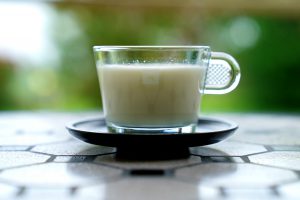How’s the spring cleaning going this year? Are you finished? Still knee deep in your piles of “keep,” “donate,” and “trash” bags? Or did you give up? Should we not even ask? Wherever you are in your annual quest to clean, tidy, and declutter, we’ve got some motivation for you not to quit (or to start). Unless, of course, you’re one of those people who’ve already finished, in which case we salute you (and silently curse you). All that excess clutter around you is more than just an eyesore, or a hazard to your feet (we’re looking at you, LEGO), it can actually drag you down mentally, and be a drain on your finances. So to keep you going, let’s look at how decluttering can be good for your mind and your wallet!
Your Brain on Decluttering
We’re going to lay something kind of deep on you: sometimes the clutter that has accumulated around you is a physical symptom of what’s going on in your mind (and sometimes it means you have kids, which also means you’ve got a cluttered, stressed mind!). So that means the opposite is also true: decluttering can have a positive affect on your mental health. How?
1. Decluttering can boost your confidence and strengthen your decision-making skills

Part of what some of us dread about decluttering is all the choices we’ll have to make, especially about what stays and what goes. When you’re in a not-so-great mental state, making decisions can become overwhelming, which can up your anxiety levels. But a good old-fashioned clean-out can boost your confidence in your decision-making skills, and even make you feel empowered! You’ll be restoring your sense of agency and usefulness as you sort through the things that you need, and the things that are might merely be “should keeps,” or things you’re holding onto to please someone or for some other reason that isn’t helpful to you.
Not only that, but making the choices about what stays and what goes in your environment can be a very powerful way to set boundaries in your life, both with yourself and with those who share your space.
2. It can reduce anxiety
Humans prefer order and symmetry, so decluttered spaces can be calming to an anxious mind; in addition, patterns can also help relieve anxiety. That means that not only does having things ordered and balanced around you help to reduce anxiety, the actual process of creating patterns by sorting similar items, taking inventory, and organizing what stays and what goes can be a sort of coping mechanism to release anxious energy. Not only that, but as Nidhi Tewari, a licensed clinical social worker and mental health therapist, points out, “The process of organizing requires that you be present, so it can be grounding in instances where anxiety is heightened.”
3. It can energize you
We get it: it can be hard to get up off that couch and start the decluttering process. But once you do, you’ll kick yourself into that high-gear, getting-stuff-done mode, which can spill over into other parts of your life. According to clinical psychologist Dr. Bhavna Barmi, “When you accomplish the relatively small task of decluttering, you attain a sense of accomplishment which leaves you more energized and helps you move towards your goals.” After all, anytime something you do (no matter how big or small) takes you toward a goal, you’ll feel better, more productive, and more motivated to keep on keepin’ on!
4. It can reduce stress and boost your mood

Feeling stressed because you can’t find things in your space, or even lashing out at the people around you when things get lost, or when the clutter gets overwhelming? Yup, clutter definitely causes stress; in fact, in one study, when working couples gave tours of their homes, women who used more words describing clutter and disorganization also tended to show higher levels of the stress hormone cortisol, suggesting chronic stress. So, on the flip side of that, decluttering can help to alleviate stress: other studies show that the actual act of cleaning and decluttering can decrease overall stress by lowering cortisol levels, and increasing endorphins (our feel-good hormone).
Your Wallet on Decluttering
Are you starting to feel good already, just thinking about how a decluttering project can benefit your mental health? Great! But the benefits don’t stop there: decluttering can actually save you money, as well! It’s a common misconception that keeping everything will save you money in the long run, but that just isn’t the case (in fact, studies show that storing unused items in your home costs roughly $10 per square foot). Here’s why:
1. You won’t need to buy multiples of anything anymore
Get this: according to one study, U.S. households collectively spend a whopping $2.7 billion annually replacing lost items! But if you declutter, once you’ve gotten rid of excess stuff, and whittled down to the stuff you need, and organized the stuff that’s left, you’ll know exactly what you have and where it is. Great for your stress levels, but also really practical because you’ll no longer end up buying something you already have!
2. You’ll save money on storage solutions
Ok, a trip to one of those stores that sells endless rows of streamlined storage solutions can be really fun, we admit it. But all of that extra stuff that you need to store all of your extra stuff is costing you a whole lot of money! And here’s a tip while decluttering, while it’s easy to get caught up in the excitement of the moment and spend a bunch of money on organization items halfway through the decluttering process, don’t. You need to know how much stuff you’re actually keeping before you buy storage.
3. You can cash in on the good stuff
Remember that old decluttering technique: divide everything into piles of things to keep, donate, and trash? You can also add a fourth category for the stuff that’s in great shape: sell. That used to be a tall order, with a lot of running around to places like consignment shops, but nowadays you have a ton of options right at your fingertips! Try sites/apps like eBay, Mercari, Poshmark, ThredUp, Vinted, and Facebook Marketplace.
And don’t forget about that donate pile: donating your unwanted stuff feels good (just soak in that good feeling knowing you’re helping others while you declutter!), but it’s also tax deductible.
4. You can’t pay bills you can’t find
Nobody likes paying bills, right? But what’s worse is paying your bills late and racking up late fees or hurting your credit score. And that’s what’s happening to a lot of people with cluttered spaces, simply because they misplace their bills! In fact, 25% of adults say they pay bills late because they lose them.
5. A decluttering mindset can rein in spending
You might notice that, once you’ve done some decluttering, you won’t want to go back to the bad old days of a cluttered house, and will be more likely to stay in that “decluttering mindset.” That might also mean that you’ll be less likely to mindlessly buy unnecessary stuff that will just become clutter, which will save you money as you shop!
6. Time is money
Having a cluttered space can suck up your time, and take you away from more productive things. Consider these stats: the average person spends two and a half days searching for misplaced items each year, and nearly 25% of us are late to school or work at least twice a week as a result of searching for lost items. Not only that, but in the average home, getting rid of clutter eliminates 40% of the housework! Just think what you could be doing with all that extra time! You’ll have more time to do stuff yourself, instead of paying someone else to do it, or you’ll be able to find better deals on things. Add to that your reined-in spending, and you might find you have to work less, or you can start paying off your debts!
There you have it: we’ve given you 11 great reasons to get back on that spring cleaning decluttering train. It might feel overwhelming when you look around you at all the clutter that’s dragging you done, but you got this. Just start small and don’t feel like you need to do everything in a day – remember that every step you take towards your goal will make you happier, healthier, and maybe even a little better off financially.















